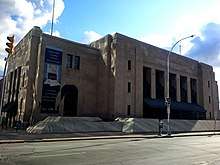Archives of Manitoba
Archives of Manitoba is the official government archive of the Canadian province of Manitoba. It is located at 200 Vaughan Street in Winnipeg, Manitoba, Canada, where it has operated from since January 1971.[1]
 | |

| |
| Former name | Library and Archives |
|---|---|
| Established | January 12, 1971 |
| Location | 200 Vaughan St. Winnipeg, Manitoba, R3C 1T5 Canada |
| Coordinates | 49.88915°N 97.14833°W |
| Type | Archive |
| Collections | Hudson Bay Archives, Legislative Library |
| Owner | Province of Manitoba |
| Website | www |
History
The Archives and Queen's Printer moved into its current location in January 1971 after the Winnipeg Art Gallery opened its newly constructed building at 300 Memorial Boulevard later in the year. The building was sold by the City of Winnipeg for $1 million in 1970. Some space was reserved for the Departments of Education and Agriculture for documentary/instructional film production.[1] It cost the Province $4 million to convert the former Winnipeg Auditorium from an arts and entertainment venue into one for archival storage. After renovations were completed in September 1975 it was renamed the Manitoba Archives Building.[2]
In 1978, a federal study found that per capita spending on the provincial archives, $252, was lower than some other provinces.[3]
Collections
The Hudson's Bay Company Archives are part of the Archives of Manitoba.[4]
The archives also holds the papers of Manitoba premier Sir Hugh John Macdonald, son of Canadian prime minister Sir John A. Macdonald.[5]
Hudson's Bay Company Archives
The Hudson's Bay Company Archives (HBCA) are thousands of mainly hand-written records and maps of the Hudson's Bay Company employees for hundreds of years.[6][7] This important archive is one of Canada's national treasures, and is a part of the United Nations Memory of the World project. The purchase of Rupert's Land from the Hudson's Bay Company is the largest land purchase in Canada's history. Rupert's Land referred to the vast water drainage basin that flows into Hudson Bay. The water basin includes the areas now known as Manitoba, Saskatchewan, parts of Alberta, Northern Ontario, Minnesota, and North Dakota. The lakes and rivers were used for travel and trading, and they stretch from Ontario to Alberta, and far south into what is now the United States.
The Hudson's Bay Company's records provide the original written history of the HBC since its inception in 1670 by Prince Rupert and others. Henry Hudson was the first European to explore and map the shores of the great bay. The first Hudson's Bay Company trading forts were built along the southern shores of Hudson Bay to provide the shortest trade route to Europe from the middle of North America. Rupert's Land consisted of the vast watershed of rivers that drained into Hudson Bay which gave access to the far western and central parts of North America. The abundance of archival documents provide the original written history of the fur trade, North American exploration and mapping, native peoples, treaty making, and the original development of the Nation of Canada. The thousands of documents supply important knowledge about the growth of the HBC's retail empire that led to one of the largest land purchases in world history, along with the original settlements of Western Canada. The archives protect the original written documents that detail the European exploration and settlement of the western frontier. Many of these documents provide detailed descriptions of native groups, forts, rivers, lakes, animals, populations, and the difficult working conditions of fur traders.
The Hudson's Bay Company Archives makes the records available and accessible to many people locally, nationally, and internationally. Their database can be searched online, and some documents are now available online.
See also
References
- "And Now Library, Archives". Winnipeg Free Press. January 12, 1971. p. 7.
- "Archives Building To Open". Winnipeg Free Press. September 20, 1975. p. 7.
- Fayerman, Pam (June 2, 1980). "Archives spending lowest in Manitoba". Winnipeg Free Press. p. 5.
- "Celebrating ten years of Hudson's Bay Company's gifts to Manitoba and to Canada.(Anniversary)". The Beaver: Exploring Canada's History. June 1, 2004. Retrieved 11 January 2010.
- Hyman, Barry (February 1, 2007). "Macdonald papers at the archives of Manitoba.(Documents & Archives)(Sir John A. Macdonald and his son Sir Hugh John Macdonald)". Manitoba History. Retrieved 11 January 2010.
- "Celebrating ten years of Hudson's Bay Company's gifts to Manitoba and to Canada.(Anniversary)". The Beaver: Exploring Canada's History. June 1, 2004. Retrieved 11 January 2010.
- Paskal, Cleo (July 8, 2006). "Peg's history a gift for tourists". Toronto Star. Toronto, Ont. p. K.02. Retrieved 11 January 2010.